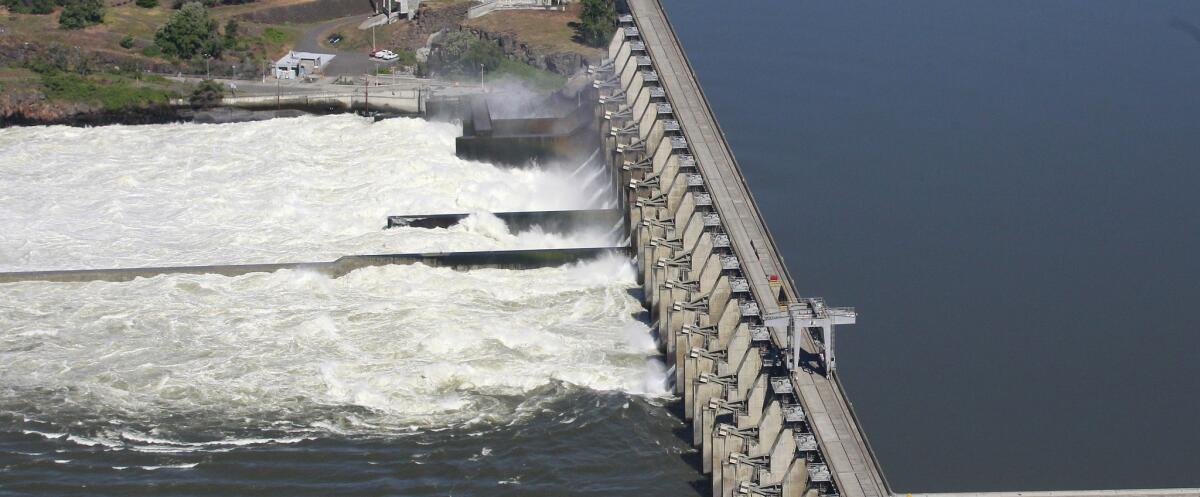Groups sue U.S. agencies, saying plan to protect salmon falls short

- Share via
Reporting from Seattle — A coalition of conservation and fishing organizations on Tuesday sued the federal agencies responsible for protecting endangered salmon and steelhead trout populations in the Pacific Northwest, charging that the agencies’ latest plan to aid 13 at-risk species falls short.
The lawsuit targets the National Marine Fisheries Service, the U.S. Army Corps of Engineers and the U.S. Bureau of Reclamation, asking a federal judge to rule the current plan invalid and order the government to craft one that better protects the species.
“We want the judge to tell the government to prepare a plan that complies with the law … and protects the salmon, which is what the law requires,” said Todd True, lead attorney for Earthjustice, a public interest environmental law firm.
The group wants the government to consider measures such as taking down four dams on the Lower Snake River or increasing so-called spill -- sending more water over hydroelectric dams on the Columbia and Snake rivers to allow juvenile fish to swim past more easily and have a better chance of reaching the ocean.
In 1991, the Snake River sockeye was listed as endangered by the federal government, which then put forth its first plan to protect and bring back the species. Not long after that plan was released, environmental and fishing groups sued, saying the protections were not sufficient.
The suing groups prevailed, said Joseph Bogaard, executive director of Save Our Wild Salmon, one of the conservation groups involved in Tuesday’s lawsuit and earlier litigation. Since the first federal listing 23 years ago, he said, the number of endangered fish populations in the region has grown to 13, and litigation over government protections has been continuous.
“Not a single population of salmon listed in the Columbia Basin has been delisted,” Bogaard said. “Populations still remain far, far from recovery. You have to ask yourself what the hell we are doing. We’re spending taxpayer and ratepayer money on programs that aren’t actually helping.”
Bogaard, True and representatives from the other organizations suing the government charge that the latest federal plan to protect the salmon, which was released in January, barely differs from earlier plans that were deemed insufficient by the courts.
But the government and an organization representing utilities, agricultural groups and other river users defended the federal plan Tuesday, saying it protects fish populations and decrying the lawsuit.
“We have made clear and demonstrable progress in rebuilding salmon and steelhead runs throughout the Columbia Basin, and we fully expect this substantial progress to continue,” said Connie Barclay, a spokeswoman for the National Oceanic and Atmospheric Administration.
The National Marine Fisheries Service, now called NOAA Fisheries, is a division of NOAA, which is part of the Commerce Department.
Barclay said her agency was not surprised by the suit but was “disappointed at the prospect of yet another cycle of litigation, which only distracts from implementing projects on the ground.”
She said NOAA Fisheries would continue to work with regional partners “to ensure the protection and restoration of these important fish and their habitats now and well into the future.”
Terry Flores, executive director of Northwest RiverPartners, called the coalition that sued the government Tuesday “perennial critics.” And she derided the lawsuit as “deja vu all over again, as they repeat claims they’ve made for years, despite documented progress that includes the most abundant salmon returns we’ve seen in decades.”
Northwest RiverPartners is an alliance of utilities, farmers, ports and other businesses. In a statement, the group noted that the law prohibits federal hydropower dams from jeopardizing fish survival – a standard it says the current plan already meets through “fish-passage technologies and safe levels of spill.”
“The agencies have been spilling at the dams at safe levels for fish for years,” Flores said. “The litigants’ demands for ever more spill could actually harm or kill the very salmon they say they want to protect.”
Follow @marialaganga for national news
More to Read
Sign up for Essential California
The most important California stories and recommendations in your inbox every morning.
You may occasionally receive promotional content from the Los Angeles Times.











